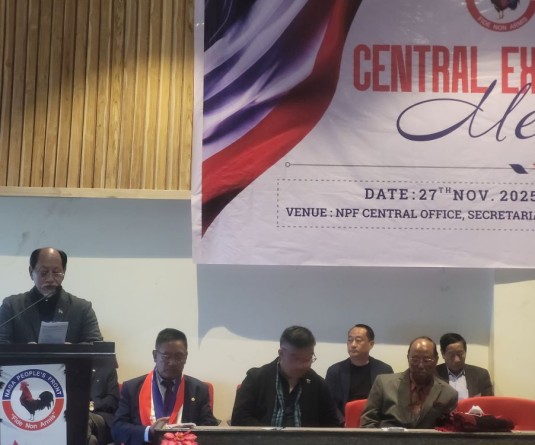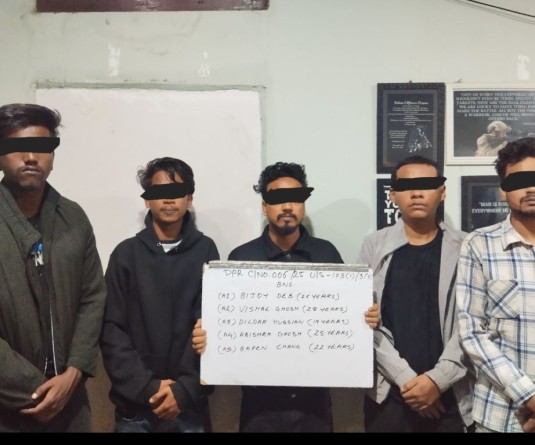A woman is seen here in a village near Pungro, Kiphire, coming back from a hard day’s work at her field. As functional illiteracy in Nagaland remains high, people are unable to draw from the wealth of information and knowledge available in today’s world.

Abokali Jimomi
Dimapur | February 23
How do you translate words like “protein” or “biodiversity” in Nagamese or in a Naga language? Statistics reveal a high literacy rate in Nagaland. However, functional illiteracy remains high. A functional illiterate person is one who does not have adequate reading and writing skills to “manage daily living and employment tasks.”
A science teacher in a rural Government High School in Nagaland narrates, “My biggest challenge is teaching Physics… it is painful to explain terms like ‘Aerodynamics’ or ‘Simple Harmonic Motion’. Science is about everything we do, see, touch and feel… it is interesting for children but when the curriculum is theoretical, it becomes so abstract that children cannot relate to the concepts no matter how much you lecture… you cannot expect a child to understand atoms, electrons and protons by memorizing textbooks. Besides, the only equipment in the lab is an old microscope. These are children of illiterate parents, and they hardly understand English even in Class 10. We have to start form fundamentals.”
For example, she says, “An exam question was, ‘what is the root cause of pollution?’, and the student’s answer was ‘Papaya Root’!”
An NRHM official describes, “We try to convey meanings using examples, diagrams… like the process of childbirth and the functions of the reproductive system. It gets difficult to find equivalent words for scientific terms… we often use names of objects they can relate to such as ‘Aloo’”
According to a Naga woman farmer, “we got this new ‘Seed Packet’ and were informed that it has instructions at the back in English, I don’t know what it says… I can hardly write my name,” holding a packet that also read “Treated with Thiram Poison.”
When reading ‘Expiry Date’ on medicine bottles has no meaning to an illiterate person, it is futile to make her read about the risk of pesticide residues in food or to become an expert in ‘Management Practices’ of nutrition, diseases or new scientific methods of cultivation or livestock rearing.
According to the WHO, “Health Literacy means more than being able to read pamphlets… improving people’s access to health information and their capacity to use it effectively… it goes beyond narrow concepts of health education and behavior-oriented communication, and addresses environmental, political and social factors that determine health.”
A Government official once said in frustration, “We give so many trainings every year, yet these villagers fail to incorporate these practices… they are lazy and useless, no matter how much we teach, they just go back to the old methods… nowadays they just attend to collect their TA/DA; it’s all about greed and money now!”
Whereas, villagers grumble, “These Government people are making money out of us. They come and train us for one day, we hardly understand what they’re saying but out of politeness we sit, sometimes sleep in the class. After they leave, maybe we can practice 5 of the 100 things taught… yet they expect us to be experts and rich like them!”
For both the learner and the instructor, communication barriers hinder productivity, cause conflicts and misunderstandings, and disable them from achieving their targets.
For a Naga villager who never attended ‘School’ or cannot make sense of the Roman Alphabet--the only script used in Nagaland-- it is a mammoth task to comprehend not just the English words thrown around but the concepts and ideas of any new knowledge system.
A linguistics scholar says, “It is sad, this is to do with the education system. It is not because people don’t have the ability to understand; sometimes it is also their attitude towards the [foreign] language.”
Our system of information dissemination needs complete reformation. An illiterate Naga villager who has never even been to Dimapur or Kohima can only be as productive as the body of knowledge she possesses; her worldview formed through the language she understands. What is the difference between an illiterate Naga villager and an illiterate English farmer? One has the advantage of language even if she cannot read and write. If all information a villager, rural student, illiterate mothers receive is in their own language, with related cultural concepts, it would be easier for them to comprehend ideas and meanings. Our rural development programs need an approach that is designed from the target learner’s perspective rather than “this will work for you” instructions. Productivity can increase only if the learner is made capable first to understand what is taught.






